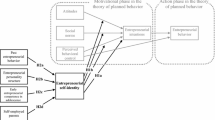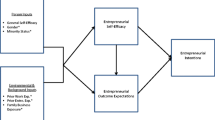Abstract
Entrepreneurship represents a form of adaptive developmental regulation through which both entrepreneurs and their ecologies benefit. We describe entrepreneurship from the perspective of relational developmental systems theory, and examine the joint role of personal attributes, contextual attributes, and characteristics of person-context relationships in predicting entrepreneurial intent in a sample 3,461 college students enrolled in colleges and universities in the United States (60 % female; 61 % European American). Specifically, we tested whether personal characteristics (i.e., gender, intentional self-regulation skills, innovation orientation) and contextual factors (i.e., entrepreneurial parents) predicted college students’ intentions to pursue an entrepreneurial career. Our findings suggest that self-regulation, innovation orientation, and having entrepreneurial role models (i.e., parents) predict entrepreneurial intent. Limitations and future directions for the study of youth entrepreneurship are discussed.
Similar content being viewed by others
References
Baltes, P. B. (1997). On the incomplete architecture of human ontology: Selection, optimization, and compensation as foundation of developmental theory. The American Psychologist, 52, 366–380.
Baltes, P. B., & Baltes, M. M. (1990). Psychological perspectives on successful aging: The model of selective optimization with compensation. In P. B. Baltes & M. M. Baltes (Eds.), Successful aging: Perspectives from the behavioral sciences (pp. 1–34). New York, NY: Cambridge University Press.
Baum, J. R., Frese, M., & Baron, R. A. (Eds.). (2007). The psychology of entrepreneurship. Mahwah, NJ: Lawrence Erlbaum Associates.
Brandtstädter, J. (2006). Action perspectives on human development. In W. Damon (Series Ed.) & R. Lerner (Vol. Ed.), Handbook of child psychology: Vol. 1. Theoretical models of human development (pp. 516–568). Hoboken, NJ: Wiley.
Cattell, R. B. (1966). Psychological theory and scientific method. In R. B. Cattell (Ed.), Handbook of multivariate experimental psychology (pp. 1–18). Chicago, IL: Rand McNally.
Cheung, G. W., & Rensvold, R. B. (2002). Evaluating goodness-of-fit indexes for testing measurement invariance. Structural Equation Modeling, 9(2), 233–255.
Clifton, J. (2011). The coming jobs war. New York: Gallup Press.
Damon, W. (2008). The path to purpose. New York: The Free Press.
Damon, W., & Lerner, R. M. (2008). Entrepreneurship across the Life Span: A developmental analysis and review of key findings: A Kauffman Foundation White paper. Kansas City, Missouri: The Kauffman Foundation.
Dyer, J. H., Gregersen, H. B., & Christensen, C. (2008). Entrepreneur behaviors, opportunity recognition, and the origins of innovative ventures. Strategic Entrepreneurship Journal, 2, 317–338. doi:10.1002/sej.59.
Freund, A. M., & Baltes, P. B. (2000). The orchestration of selection, optimization and compensation: An action-theoretical conceptualization of a theory of developmental regulation. In W. J. Perrig & A. Grob (Eds.), Control of human behavior, mental processes, and consciousness: Essays in honor of the 60th birthday of August Flammer (pp. 35–58). Mahwah, NJ: Lawrence Erlbaum.
Freund, A. M., & Baltes, P. B. (2002). Life-management strategies of selection, optimization and compensation: Measurement by self-report and construct validity. Journal of Personality and Social Psychology, 82, 642–662.
Geldhof, G. J., Bowers, E. P., Johnson, S. K., Hershberg, R., Hilliard, L., & Lerner, R. M. (in press). In P.C.M. Molenaar, R. M. Lerner, & K. Newell (Eds.), Handbook of relational developmental systems theory and methodology. New York, NY: Guilford.
Geldhof, G. J., Porter, T., Weiner, M., Malin, H., Bronk, K. C., Agans, J., Mueller, M. K., Damon, W., & Lerner, R. M. (2012). Fostering youth entrepreneurship: Preliminary findings from the young entrepreneurs study. Manuscript submitted for publication.
Gestsdóttir, S., & Lerner, R. M. (2008). Positive development in adolescence: The development and role of intentional self regulation. Human Development, 51, 202–224.
Gestsdottir, S., Urban, J. B., Bowers, E. P., Lerner, J. V., & Lerner, R. M. (2011). Intentional self-regulation, ecological assets, and thriving in adolescence: A developmental systems model. In R. M. Lerner, J. V. Lerner, E. P. Bowers, S. Lewin-Bizan, S. Gestsdottir, & J. B. Urban (Eds.), Thriving in childhood and adolescence: The role of self-regulation processes. New Directions for Child and Adolescent Development, 133, 61–76.
Hébert, R. F., & Link, A. N. (1989). In search of the meaning of entrepreneurship. Small Business Economics, 1, 39–49.
Lerner, J. V., Bowers, E. P., Minor, K., Boyd, M. J., Mueller, M. K., Schmid, K. L., Napolitano, C. M., Lewin-Bizan, S., & Lerner, R. M. (2012). Positive youth development: Processes, philosophies, and programs. In R. M. Lerner, M. A., Easterbrooks, & J. Mistry (Eds.), Handbook of psychology, volume 6: Developmental psychology (2nd edn, pp. 365–392). Editor-in-chief: I. B. Weiner. Hoboken, NJ: Wiley.
Lerner, R. M., & Busch-Rossnagel, H. A. (1981). Individuals as producers of their development: Conceptual and empirical bases. In R. M. Lerner & H. A. Busch-Rossnagel (Eds.), Individuals as producers of their own development: A life-span perspective (pp. 1–36). New York: Academic Press.
Lerner, R., & Damon, W. (2012). Entrepreneurship in adolescence: A relational developmental systems approach. International Journal of Developmental Science, 6(3), 15–34.
Little, T. D. (1997). Mean and covariance structures (MACS) analyses of cross-cultural data: Practical and theoretical issues. Multivariate Behavioral Research, 32, 53–76.
Little, T. D. (in press). Longitudinal structural equation modeling. New York: Guilford.
McClelland, D. C. (1961). The achieving society. Princeton, NJ: Van Nostrand.
McClelland, D. C. (1965). N achievement and entrepreneurship: A longitudinal study. Journal of Personality and Social Psychology, 1, 389–392.
Neck, H. M., Zacharakis, A. L., Bygrave, W. D., & Reynolds, P. D. (2003). Global entrepreneurship monitor 2002 executive report. Babson Park, MA: Babson College.
Obschonka, M., & Silbereisen, R. K. (2012). Entrepreneurship from a developmental science perspective. International Journal of Developmental Science, 6(3–4), 107–115.
Obschonka, M., Silbereisen, R. K., & Schmitt-Rodermund, E. (2011). Successful entrepreneurship as developmental outcome: A path model from a life span perspective of human development. European Psychologist, 16(3), 174–186.
Overton, W. F. (2010). Life-span development: Concepts and issues. In W. R. Overton (Ed.), Cognition, biology, and methods across the life span: Vol. 1, Handbook of life-span development. Editor in chief: R. M. Lerner. Hoboken, NJ: Wiley.
Overton, W. F., & Lerner, R. M. (2012). Relational developmental system: A paradigm for developmental science in the postgenomic era. Behavioral and Brain Sciences, 35(5), 375–376.
Overton, W. F., & Müller, U. (2012). Meta-theories, theories, and concepts in the study of development. In R. M. Lerner, M.A. Easterbrooks, & J. Mistry (Eds.), Comprehensive handbook of psychology: Developmental psychology (Vol. 6, pp. 19–58). Editor-in-Chief: Irving B. Weiner. New York: Wiley.
Rauch, A., & Frese, M. (2007). Let’s put the person back into entrepreneurship research: A meta-analysis on the relationship between business owners’ personality traits, business creation and success. European Journal of Work and Organizational Psychology, 16, 353–385.
Reynolds, P. D., Bygrave, W. D., & Autio, E. (2004). Global entrepreneurship monitor 2003 executive report. Babson Park, MA: Babson College.
Schmitt-Rodermund, E. (2004). Pathways to successful entrepreneurship: Parenting, personality, early entrepreneurial competence, and interests. Journal of Vocational Behavior, 65(3), 498–518.
Schmitt-Rodermund, E. (2007). The long way to entrepreneurship: Personality, parenting, early interests, and competencies as precursors for entrepreneurial activity among the ‘Termites’. In R. K. Silbereisen & R. M. Lerner (Eds.), Approaches to positive youth development (pp. 205–224). London: Sage Publications.
Schmitt-Rodermund, E., & Vondracek, F. W. (2002). Occupational dreams, choices and aspirations: Adolescents’ entrepreneurial prospects and orientations. Journal of Adolescence, 25, 65–78.
Schoon, I., & Duckworth, K. (2012). Who becomes an Entrepreneur? Early life experiences as predictors of entrepreneurship. Developmental Psychology, Advance online publication. doi: 10.1037/a0029168.
Schröder, E., & Schmitt-Rodermund, E. (2007). Development of entrepreneurial interests, attitudes and behavior. In V. B. Skorikov & W. Patton (Eds.), Career development in childhood and adolescence (pp. 127–142). Rotterdam: Sense Publisher.
Schröder, E., Schmitt-Rodermund, E., & Arnaud, N. (2011). Career choice intentions of adolescents with a family business background. Family Business Review,. doi:10.1177/0894486511416977.
Scott, S. G., & Bruce, R. A. (1994). Determinants of innovative behavior: A path model of individual innovation in the workplace. Academy of Management Journal, 37(3), 580–607.
Stiftung, B. (Ed.). (2007). Civic engagement as an educational goal. Guterslöh, Germany: Verlag Bertelsmann Stiftung.
Weiner, M. B., Geldhof, G. J., Lerner, R. M. (2011). The entrepreneurship intentional self regulation questionnaire: Factorial and concurrent validation. Poster Presented at the Society for the Study of Human Development, in Providence, RI.
Ziegelman, J. P., & Lippke, S. (2007). Use of selection, optimization, and compensation strategies in health self-regulation: Interplay with resources and successful development. Journal of Aging and Health, 19, 500–518.
Acknowledgments
This article was supported by a grant from the John Templeton Foundation. We thank Bill Damon, Anne Colby, and all of our colleagues at the Stanford Center on Adolescence for their assistance designing and collecting data for the Young Entrepreneurs Study.
Author contributions
G. John Geldhof acted as lead author, performing all statistical analyses and contributing to all written aspects of this article. Michelle Wiener cleaned and helped organize the quantitative data, aided in the literature review, and contributed to the theoretical framing and writing of this article. Jennifer P. Agans led the quantitative data collection, cleaned and helped organize the quantitative data, and contributed to the theoretical framing and writing of this article. Megan Kiely Mueller cleaned and helped organize the quantitative data, and contributed to the theoretical framing and writing of this article. Richard M. Lerner is co-PI of the young entrepreneurs study and contributed to the theoretical framing and writing of this article.
Author information
Authors and Affiliations
Corresponding author
Rights and permissions
About this article
Cite this article
Geldhof, G.J., Weiner, M., Agans, J.P. et al. Understanding Entrepreneurial Intent in Late Adolescence: The Role of Intentional Self-Regulation and Innovation. J Youth Adolescence 43, 81–91 (2014). https://doi.org/10.1007/s10964-013-9930-8
Received:
Accepted:
Published:
Issue Date:
DOI: https://doi.org/10.1007/s10964-013-9930-8




